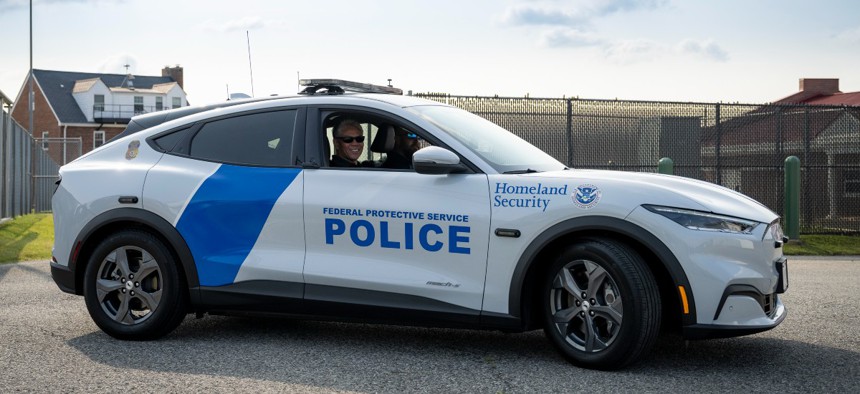DHS to Begin Electric Vehicle Adoption for Law Enforcement

Homeland Security Deputy Secretary John Tien participates in the rollout of the Ford Mach-E for use by the Department of Homeland Security. Tia Dufour/DHS
The Mustang Mach-E model is currently undergoing cybersecurity risk tests.
The Department of Homeland Security is working on introducing a new fleet of electric vehicles to perform law enforcement functions, making it the first federal agency to implement cars with zero-emissions technology on such a wide scale.
The agency will switch officers to the Ford Mustang Mach-E model for the first round of the agency’s new EVs to be used across the U.S.
“DHS is leading the charge among federal agencies to transition its fleet vehicles from internal combustion engines to zero-emission electric vehicles,” said Deputy Secretary of Homeland Security John Tien. “DHS is proud to be the first federal agency to upfit a battery electric vehicle for law enforcement use. As we ramp up EV adoption, we are excited to see how this and other EVs perform for our mission.”
DHS’s current vehicle inventory is over 50,000, according to Tien. EVs will replace roughly 60% of those current law enforcement vehicles that have a standard internal combustion engine.
The agency’s car overhaul coincides with the Biden administration’s larger goals to bring more sustainable infrastructure to the U.S. and arrive at a net-zero economy by 2050. DHS has undertaken its own climate plan, with one key pillar being car fleet electrification.
“DHS is proactively seeking to reduce greenhouse gas emissions, EVs have the potential to significantly improve federal fleet efficiency and reduce vehicle operation and maintenance costs,” said R. D. Alles, the acting under secretary for management at DHS. “DHS is also looking to create climate-resilient facilities and infrastructure, and to continue transitioning the DHS vehicle fleet towards electrification in the years to come.”
The new Mustang model went through various stress tests before being approved as DHS’s new law enforcement vehicle. Critically, the Federal Protective Service is conducting other tests into the vehicle’s cybersecurity posture.
As the software technology in cars becomes more sophisticated and increasingly connected, many modern vehicles are part of the larger Internet of Things, making them susceptible to hacks and other digital infiltration.
NEXT STORY: Feds prep $500M program for transportation tech






